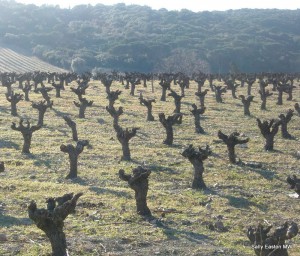Minerality quote, unquote 6
I did the first one of these five and half years ago. Are any patterns emerging? Has there been an evolution in thought on a definition over time?
This one is playing a bit of catch up. I’ve been pre-occupied writing a book, which, inevitably with hindsight, turned into an even bigger project than I had originally anticipated.
This is a compilation of some views from Austria and the south of France:
Willibald Balanjuk, of Freigut Thallern (Thermenregion, Austria), May 2012
Minerality is “good fruit with a bitter (but not medicinal bitter) aftertaste … grapefruit bitterness as a fruit-driven interpretation of minerality; there is no sweet aftertaste, you have fruit bitterness.”
He also said minerality is “an expression in wine which focuses the wine on the finish. It helps to clean and refresh the palate … it brings some impression and a being eager to re-taste and drink the wine.”
He added the advantage of minerality “is a bigger ageing potential, more complexity potential, and a more refreshing wine.” Comparing it to a fruity wine which is “good for the beginning of the palate, [a mineral wine] is not an everyday pleaser”.
Bernhard Stadlmann, Weingut Stadlmann (Thermenregion, Austria), May 2012
Stadlmann notes “a salinity from the limestone” of Thermenregion.
Paul Gordon of Domaine la Sarabande, (Faugères, France), February 2012
“Schist gives minerality”.
Jem Harris of Les Fusionels (Faugères, France), February 2012
“Schist drew us to this area. The poor soil forces roots deep into the ground. You get a notion of terroir. Imparts certain amount of mineral focus, graphite. Holds heat of day and release it during the night.”
Domaine des Prés Lasses (Faugères, France) February 2012
“In schist the roots have to go deep to find water. The mineral character of the soil gives a special character. In Faugères we have this with more elegance and fineness in the body with mineral taste. Lighter in general impression.“
Vianney Fabre of Château d’Anglès (La Clape, Languedoc, France) October 2012
Speaking of minerality on his white wine, which has modest acidity – minerality is more often spoken of as being associated with wines of high(er) acidity – said it is a “taste of rock like tannins, it’s on the front of the teeth.”
Jérôme Roger, Château du Prieuré des Mourgues, (Saint Chinian, France), March 2013
A “character of schist is minerality. It is difficult to see minerality in wine. It is a little bit of salty taste.”
Sylvie and André Bérenger of Domaine La Bérangeraie (Cahors, France) Sept 2013
“Minerality is an iron taste, on siderolytic soils.” (Sidérolythique soil is clay-limestone with iron deposits)




